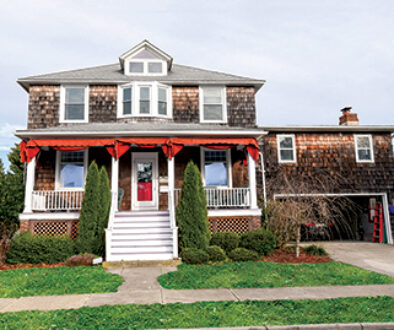Harbor Square Theatre: A Classic Revisited

If there’s ever been a time when Cape May County—and the world at large—needed a little entertainment, it’s now, after enduring over a full year of a global pandemic.
Fortunately, entertainment is back.
Though the theater was closed—along with much of America—from March until just after Labor Day 2020, Harbor Square Theatre is now open, operating, and excited about a summer full of entertainment and of course, audiences.
“We’re currently operating at a 100% capacity,” says Jennifer Hasson, the General Manager of Harbor Square, who executed each varying level of capacity required by the state as it was rolled out.
While fully operational and open for business as usual, Harbor Square employs COVID safety precautions, including the suggested use of masks for the unvaccinated, HEPA filters in the filtration systems, the implementation of UV wands to kill germs on seats, and of course, plenty of hand sanitizer. “And with 40-foot-high ceilings, it’s almost like being outside,” says Hasson.
They are currently running a full slot of movies—four to five shows, six days per week, with three on Sundays. And while Hasson doesn’t expect an overwhelming number of people to come to the theatre during the bright days of summer, rainy days are another story entirely.
“You can’t compete with the beach, but this Memorial Day Weekend it rained and we had 3500 people. It was like the pandemic never happened. Not to say we aren’t taking precautions,” says Hasson, “but as far as the crowd goes, it seemed like a fairly normal holiday weekend in the rain. Lots of sold-out shows.”
Crowds are par for the course at Harbor Square Theatre. The lights on the marquee of this old-becomes-new theatre beckon both locals and vacationers. As the only operating movie theater in Cape May County, Harbor Square could attribute its success to being the last theater standing, but that would only be a small part of the story.
The building that houses Harbor Square was built in 1947, a golden age for movies and movie theatres alike. Hunt’s Harbor Theatre was a single screen venue, opened to the public in 1949, and was pure escapism. “Going to the movies was a like a grand day,” says Hasson. “People got dressed up to go to the movies.”
Not only was it an event, but also lengthy. Cartoons or newsreels bookended feature films, making the theater a real destination.
As movie theaters evolved from almost glamorous cinemas to multiplexes, so too did the one in Stone Harbor. “It went from a single to a twin, then to four screens, with the fourth screen in an addition,” says Hasson. The theatre also changed hands, from the Hunt movie franchise to Frank Theatres, to Hoyt and back to Frank.
At some point, the building added a fifth screen by splitting one theater in half. And as time wore on, smaller, subtler changes were made. Like many buildings of its time, the theater underwent modifications—drop ceilings replaced higher and more elaborate ceilings, a curved wall was hidden—that placed more emphasis on efficiency and practicality than on design and aesthetic. While it was still a movie theater, it had lost a lot of the panache and style of its golden age.

In 2016, the building was purchased by Clint Bunting, Scott Kaufman, and Brett Denafo. The trio completely renovated the building in an attempt to restore it to its former glory. “It was gutted all the way down to the cement,” says Hasson, who had worked at the theater in 2015 just before it was sold. “It was cement and cinder blocks. Just walls. You could snap your fingers and hear them at the back of the theater, that’s how empty it was.”
While Hasson admits it was surreal to see a space she loved torn apart, she’s a big fan of the current version. “It’s a completely different place,” says Hasson. “They opened up the ceilings and the architecture in the lobby. The stained-glass panels, the curved walls, they restored all of that. It’s a more breathable space…lighter color on the ceiling. You walk in and it was almost like the building was happier.”
The community seems to agree, lining up in the art deco-inspired venue in both on and off seasons. “It’s got the look and feel of class without charging $25 per ticket,” says Hasson. “You feel like you’re walking into a higher-end place. It’s cleaner, fresher, and brighter.”
That’s something guests notice as soon as they walk through the door. The place is like a throwback in all the right ways, and whether you’re getting in line for concessions or peeking over the half wall into the attached Burger Bar. If you’re a local, you will often see someone you know. “There’s not a lot of space in the lobby—it’s not like a regular movie theater. It has a cozy feel,” says Hasson.
Part of what makes Harbor Square so unique, in addition to its nod to its vintage heritage, is the Harbor Burger Bar. Because while Harbor Square Theatre pays homage to the past in its décor and style, it’s actually a very modern theater, complete with delicious food.
Harbor Square Theatre leases space at the front of the lobby to Harbor Burger Bar. While guests can and often do choose to sit in Harbor Burger Bar for their meals—flatbreads, paninis, salads, and of course burgers—they also have the option of ordering their meal and enjoying it in the theatre, as they do in movie taverns.

“We’ve hybridized the idea [of the movie theater tavern] because we are retro-fitted into an old theatre,” says Hasson. Pandemic restrictions don’t interfere with enjoying food in the theater. There is a symbiotic relationship between the theater and restaurant that transcends simply serving food to movie-goers; the Harbor Burger Bar also celebrates movies, in both its design—marquee lighting and elements of Hollywood gold and the red carpet—as well as their cocktail menu.
Cocktails are created with the movies in mind. Past options have included the Shirley Temple Black, Silver Screen Margarita, and Saturday at the Movies Martini. They even create themed drinks towards larger movie releases. With signature and themed cocktails, full beer and wine lists, and even spiked milkshakes, there’s really something for everyone to enjoy. Even better? You can bring your cocktails as well as your dinners into the theatre.
“With the bar service, it’s just a way to ultimately enjoy your movie,” says Hasson. “To have a glass of wine on a date, it becomes more than just a movie, but a whole experience.”
In addition to a menu full of deliciousness—this vegan still fondly recalls the Bleu-rugula burger, made with sautéed onions and mushrooms with truffle bleu cheese aioli topped with fresh arugula, served with fries–there are lots of portable options that make eating with a cardboard container on your lap more do-able than you’d imagine. Handhelds like tuna nachos, pulled pork sliders and chicken tenders are perfect for taking on the go, especially when your destination is right down a hallway.
If you’re worried about missing out on your popcorn and Milk Duds, don’t be. In addition to the Harbor Burger Bar, which sits at the front of the building, there is also a full concession stand further into the theatre, with all the options you’d find at traditional movie theatres.
The addition of the Harbor Burger Bar rounds out the guest experience, but so too do the extra events. “This is really about the customer experience,” says Hasson. “We want the customers to fully enjoy themselves.” That level of appreciation extended into the pandemic with opportunities for people to see movies outside their homes through theater rentals.
“There’s so much scheduling in the summer that it’s hard to offer it, but we will offer rentals again in the fall,” says Hasson. “People genuinely enjoyed that. There’s something about seeing a movie in a theater that’s just different than seeing it at home.”
The building has four theatres of varying sizes, seating anywhere from 86 to 240 guests. Theatre Two, the largest and most impressive, features stadium-style seating in addition to a large, rounded screen, making it a nearly perfect viewing space. “There’s not a bad seat in that house,” says Hasson.

Theaters One, Three, and Four are equally well done, albeit smaller spaces with traditional sloped floors. The entire building holds approximately 500 guests.
As for the movies, Harbor Square shows everything from Frozen 2, the Avengers movies, and the Star Wars series, to more independent films like Once in a Hundred Years: The Life and Legacy of Marian Anderson. Though some blockbusters were shuffled around this year due to COVID—expect to see the much-anticipated Top Gun: Maverick as well as the Ghostbusters sequelin November instead of July—other movies, like In the Heights and Peter Rabbit 2 are rolling out this summer.
And while Harbor Square Theatre is an excellent place to see a blockbuster, it’s an equally great place to appreciate an art film, too.
Hasson, who studied film, loves anything that pushes the artistry of filmmaking. “I often reference the first five minutes of the movie, where they tell an entire story in moving images, with no words, in five minutes,” says Hasson.
As such, Harbor Square Theatre squeezes in independent films when they can. “We do a lot of offbeat stuff in the hours when there isn’t a late show,” says Hasson, referring to the off-season months, when the venue might host a live Q&A with a director after an independent film screening, or screen a cult classic with a local actor, as they did last year for local resident Will Keenan’s movie, Chop. This July, guests can expect to see Sagacity, directed by local resident, S.J. Accardi.
Movies may be the name of the game at Harbor Square Theatre, but community events don’t fall far behind. “We screen the classic Jaws every Fourth of July weekend, and we have people that kick off their family reunions there,” says Hasson.
In addition to repeat events that can mark the advent of summer, Harbor Square Theatre will screen movies for schools. Students at Stone Harbor School usually head there for a screening of The Polar Express each December.
“Being the only movie theater, we really feel attached to our community,” says Hasson. “It’s important to us to keep up on community events and to be a place where people can gather.”
In the pre-pandemic off-season, Harbor Square Theatre was also home to the Sunday Cinema Series, a cultural program that Hasson hopes to offer in the fall. Run by local artist Terri Amig, the series was in its infancy when COVID shut everything down, but it had screened movies such as Run Lola Run and the director’s cut of Bladerunner.
“I’d like to see if we can include some sort of streaming thing because I think that that particular series would benefit greatly from it,” says Hasson. “Streaming has become such an important part of the conversation over the last year, it’s now going to be part of the theater industry to me.”
“I approached Harbor Square with the idea of a private film club,” says Amig. “It took me two years to put together a proposal, but when I did, Jen was all in. They want to be able to offer alternative forms of entertainment and are so willing to try new things and offer more culture to our area. It’s updated, extremely comfortable, and really convenient to have the restaurant to be able to discuss aspects of the films afterward.”
In addition to running special films and series, Harbor Square Theatre is also home to live shows. Live shows in a movie theatre? Crazy as it sounds, yes.
“I don’t know what came first—the comedy or the music,” says Hasson, about the live shows that have taken place at Harbor Square Theatre.
The cement stage that holds the screen in Theatre Two has been there since 1949, and it takes up almost the entire width of the room. Extending several yards in front of the screen—and with amphitheater-type seating—it’s a surprisingly good venue for live shows.
These events have included almost monthly comedy shows with Joel Richardson and Soul Joel’s Comedy—expect two more this summer, on July 18th and August 15th—as well as a series of extraordinary musical events produced by local musician Marnie Lengle which were put on hold during the pandemic.
“The theater has been an absolute portal to musical magic,” says Lengle. “The room is a blast. Every musician who takes part gets such a huge rush from the night. It’s a dream for so many of us to play to an attentive crowd of music lovers. They are there because they love the particular band or the genre that we are paying homage to, but they are also there to be our cheerleaders and give us the courage and creative freedom to let loose.”
Lengle’s shows have all included a group of talented local musicians playing to a certain theme. Past shows have included tributes to Bruce Springsteen; The Last Waltz; People Get Ready, celebrating African American musicians; the Allman Brothers Band, the Rolling Stones, and many more. Hasson is hopeful about the return of these shows as well, though nothing has been booked yet. [Editor’s note: if you can get to one of these when they resume, go.]
“We want to bring all of the entertainment back because people have been cooped up and separated. We want to bring them back together and have a good time,” says Hasson, who has missed the movies, and the movie-going experience, as much as anyone.
“I missed the audiences so much, their reactions,” says Hasson. “There are times we sneak in and wait to see people’s reactions to a movie. 200 people gasping, or cheering, at once—it’s like a live performance energy, and you miss it.”
The fact that Harbor Square Theatre is the last operating theater in Cape May County is only part of the reason for their success.It’s the commitment to a quality entertainment experience; a well-cared for and carefully restored locale; and the inclusion of one-of-a-kind cultural experiences in an area where it’s desperately needed that all combine to make the venue an epicenter of entertainment in the county. In the past few years, Square Theatres has purchased, restored, and opened what is now the Tilton Square Theatre as well as the Ventnor Square Theatre, which boasts a full restaurant and a speakeasy bar downstairs. They are also in the process of restoring another closed-down theater: Frank’s Rio Grande.
While our beloved independent movie theater is becoming the first in a small chain, we expect that Square Theatres will continue to offer a premiere movie-going experience. And we can’t wait.

Remembering Beach Theatre in Cape May
When we think about the restoration of old, shuttered movie houses, it’s impossible not to think about Cape May’s own Beach Theatre.
Like Harbor Square Theatre, Beach Theatre was also built and originally operated by Hunt Theatres, Inc., which owned 17 venues in New Jersey and Pennsylvania, most of which were in Cape May County.
Beach Theatre famously opened on June 29, 1950 with a screening of Father of the Bride. And in its heyday, it was, according to CinemaTreasures.org, as glamorous as they came, featuring two hand-painted murals, crystal chandeliers, and a lobby that had room for 200 people, in addition to seating for 800.
The architect, William H. Lee, won an award for his design, receiving the following accolades from Exhibitor Magazine in 1950: “The architect blended his design of slender colonial-like columns, lace-like balustrade and colonial lanterns to blend with the general mid-Victorian architecture of the resort. Natural wood paneling with exhibits of contemporary artists with an adjacent TV lounge were the special features of the foyer.”
By all accounts, it was beautiful, and included secret and beautiful views.
“You could go up the stair by the projector booth, and go on the roof,” says Jennifer Hasson, who in addition to being the current General Manager of Harbor Square Theatre, used to work at Beach Theatre. “The view of the coastline—I don’t think there was a better one.”
It’s hard to imagine the fate that was to befall Beach Theatre, despite the fact that it happened over the course of many years.
Decades after opening, the Beach Theatre experienced a similar fate to Harbor Square Theatre—It was turned from a single screen into a multi-screen theater as multiplexes became popular; and it was purchased and run by Frank Theaters.
In 2007, Frank Theaters closed Beach Theatre and proposed—much to the horror of many Cape May residents—demolition.
The theater received a fleeting reprieve. In November 2007, it was re-opened by the nonprofit organization Beach Theatre Foundation, Inc., under a one-year lease. And while the theater was listed in Preservation New Jersey’s list of the state’s ten most endangered historic sites, and a fight to save it included lengthy legal battles, the theaterrr would not be saved.
In 2011, the auditorium of the theater was demolished, leaving only its once grand façade and retail wings. Eight years later, in 2019, the city officially closed the space, citing safety.
In November 2019, the Press of Atlantic City announced that the theater would be developed into a year-round resort by Icona Resorts.
Cities and towns need a little bit of everything to thrive—eateries, places to stay, and of course, a place to watch a movie. And as elegant and historic as the late, great Beach Theatre was, well—Cape May is a little sadder for letting her go.



